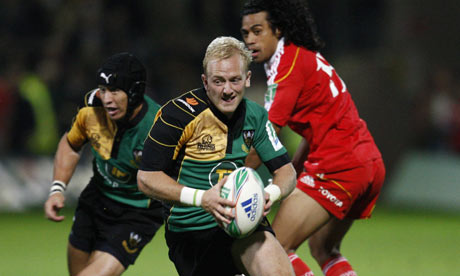
The restorative powers of the Heineken Cup provided a timely reminder that invention yields reward. Northampton's victory over Munster on Saturday was full-on and fierce, but Shane Geraghty showed another side of the game that, like the sun in summer, appears all too infrequently.
The England manager, Martin Johnson, is only a few weeks away from the start of the autumn internationals but his starting midfield is far from resolved. Riki Flutey is injured, Toby Flood has not played this season, Mike Tindall missed Gloucester's victory over Newport Gwent Dragons on Friday night with a hamstring strain, Jordan Turner-Hall is out until the new year and Danny Cipriani will not play again until December.
Geraghty's positive start to the campaign has been a significant bonus for Johnson. The outside-half went into the Munster match on the back of a display against Wasps that had seen him make some mistakes under pressure and his reaction was going to be instructive.
The game needs players in pivotal positions who are not cowed or deterred by any errors they may make. Dan Biggar suffered in the opening 15 minutes against Leicester yesterday but recovered to help his side take a healthy lead. Munster, like Wasps, are opponents who look to squeeze opponents, quickly closing down time and space.
Northampton's pack laid the platform but Geraghty made the difference. His try at the end of the opening half, when Munster expected him to kick a penalty, was typically opportunistic and it was his awareness all evening that marked him out. Kicking, for him, was not a second option, never mind a first.
Will Johnson and his management team trust Geraghty to start at outside-half against Australia next month? They have Jonny Wilkinson to fall back on: the 2003 World Cup winner is enjoying one of his longest sequence of matches since he dropped the goal in Sydney to land the Webb Ellis Cup, but it is a question of what England are looking for.
Wilkinson is the safer option. He kicks his goals, he is a smart executor of set moves and he makes opponents nervous because of his accuracy and his ability to kick with both feet makes it more difficult to put him under pressure. He still relishes tackling, despite a sequence of injuries that would make it understandable if there were times when he turned the other shoulder.
Wilkinson's weakness as an outside-half, as he showed in his last start for England against Scotland in Murrayfield last year, is that he is not an instinctive, reactive outside-half. There is probably no better No10 when it comes to defending a lead, nursing his forwards by gaining position, but playing catch-up is not his forte. Even in 2003, when England were trailing Wales at half-time having been outplayed, they had to bolster Wilkinson by bringing on the more tactically astute Mike Catt.
Geraghty is an outside-half who can turn a game in a couple of strides but he showed against Munster that he is able to contain his exuberance and be patient, waiting until something is on. International rugby is about judgment, striking the balance between ambition and realism because mistakes cost.
England adopted an open approach last November with Cipriani at outside-half. They looked to move the ball, even from deep positions, but ended up doing so without creating space and too often found themselves playing behind the gainline and struggling at the breakdown. They tightened up at the start of the Six Nations, bringing in the more prosaic Andy Goode at outside-half, but as the tournament unfolded, Flutey became the tactical hub and his absence this autumn is cruel for Johnson.
England could opt to start with both Wilkinson and Geraghty. One would wear 10 and the other 12, but it would be wrong to enchain them. They are interchangeable and it would make more sense for Geraghty to be first receiver in broken play, but England have to decide if the partnership would work defensively. The Ospreys played Biggar and James Hook at 10 and 12 at Leicester and, despite the Tigers having a shortage of fit backs, the pair lacked understanding in defence.
With Brian Smith as backs coach, England should not lack ambition. The opening sequence of Premiership matches was more notable for kicking out of hand than running, but the first round of the Heineken Cup was enriched by more attacking intent. There will be few more compelling matches this season than Northampton's victory over Munster, while Leicester and Ospreys served up a surprisingly entertaining encounter at Welford Road. It is with this adventurous approach, two years out from the World Cup, where England's salvation lies.

